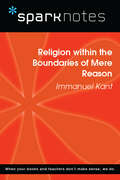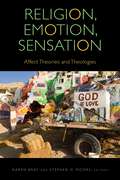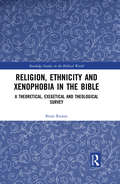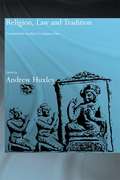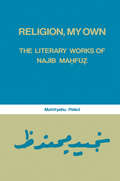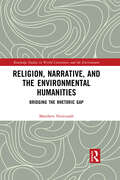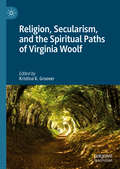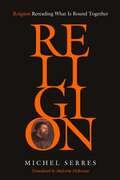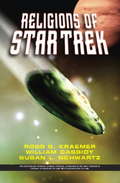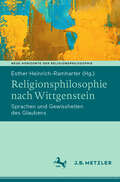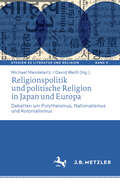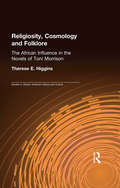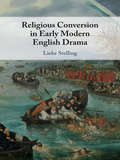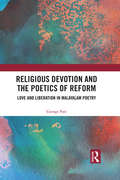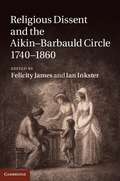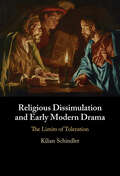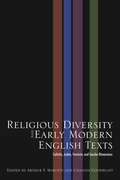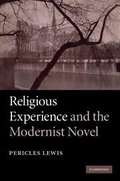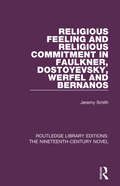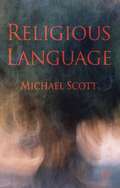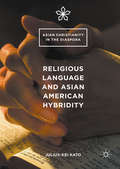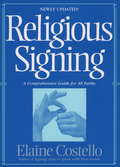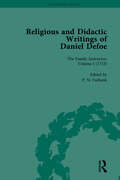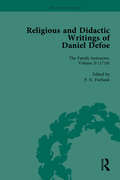- Table View
- List View
Religion within the Boundaries of Mere Reason (SparkNotes Philosophy Guide)
by SparkNotesReligion within the Boundaries of Mere Reason (SparkNotes Philosophy Guide) Making the reading experience fun! SparkNotes Philosophy Guides are one-stop guides to the great works of philosophy–masterpieces that stand at the foundations of Western thought. Inside each Philosophy Guide you&’ll find insightful overviews of great philosophical works of the Western world.
Religion, Emotion, Sensation: Affect Theories and Theologies (Transdisciplinary Theological Colloquia)
by Karen Bray and Stephen D. MooreReligion, Emotion, Sensation asks what affect theory has to say about God or gods, religion or religions, scriptures, theologies, and liturgies. Contributors explore the crossings and crisscrossings between affect theory and theology and the study of religion more broadly, as well as the political and social import of such work.Bringing together affect theorists, theologians, biblical scholars, and scholars of religion, this volume enacts creative transdisciplinary interventions in the study of affect and religion through exploring such topics as biblical literature, Christology, animism, Rastafarianism, the women’s Mosque Movement, the unending Korean War, the Sewol ferry disaster, trans and gender queer identities, YA fiction, queer historiography, the prison industrial complex, debt and neoliberalism, and death and poetry.Contributors: Mathew Arthur, Amy Hollywood, Wonhee Anne Joh, Dong Sung Kim, A. Paige Rawson, Erin Runions, Donovan O. Schaefer, Gregory J. Seigworth, Max Thornton, Alexis G. Waller
Religion, Ethnicity and Xenophobia in the Bible: A Theoretical, Exegetical and Theological Survey (Routledge Studies in the Biblical World)
by Brian RaineyReligion, Ethnicity and Xenophobia in the Bible looks at some of the Bible’s most hostile and violent anti-foreigner texts and raises critical questions about how students of the Bible and ancient Near East should grapple with "ethnicity" and "foreignness" conceptually, hermeneutically and theologically. The author uses insights from social psychology, cognitive psychology, anthropology, sociology and ethnic studies to develop his own perspective on ethnicity and foreignness. Starting with legends about Mesopotamian kings from the third millennium BCE, then navigating the Deuteronomistic and Holiness traditions of the Hebrew Bible, and finally turning to Deuterocanonicals and the Apostle Paul, the book assesses the diverse and often inconsistent portrayals of foreigners in these ancient texts. This examination of the negative portrayal of foreigners in biblical and Mesopotamian texts also leads to a broader discussion about how to theorize ethnicity in biblical studies, ancient studies and the humanities. This volume will be invaluable to students of ethnicity and society in the Bible, at all levels.
Religion, Law and Tradition: Comparative Studies in Religious Law
by Andrew HuxleyThis book brings together two scholarly traditions: experts in Roman, Jewish and Islamic law, an area where scholars tend to be familiar with work in each area, and experts in the legal traditions of South and East Asia, which have tended to be less interdisciplinary. The resulting mix produces new ways of looking at comparative law and legal history from a global perspective, and these essays contribute both to our understanding of comparative religion as well as comparative law.
Religion, My Own: Literary Works of Najib Mahfuz
by Mattityahu PeledThe Egyptian writer Najib Mahfuz has been acclaimed by many Arab critics as the greatest living Arabic literary writer and one of the pioneers of social criticism in literature in Egypt. This work, the only major book-length study of Mahfuz's work, traces his literary development as a writer and analyzes the thematic aspect of his work: the relationship between individual and society. Mahfuz's method of presenting this relationship in his novels and short stories is studied within the context of his Islamic world view. ,Mahfuz's writing follows the models set by modern Western literature. His unique contribution to Egyptian literature is that he made the novel and the short story a means of exploring indigenous problems. Egyptian writers who preceded him paved the way for his achievements, but none reached his mastery. He enabled the Egyptian genius to express itself in literary forms new to Arabic Literary tradition.The literary career of Mahfuz is marked by three distinct phases. The first is the Pharaonic phase (1935-38), in which three historical novels were written. The second is the realistic phase (1938-52), in which most of his great works were written, including the Cairo trilogy. The third phase began, after a pause of six years, in 1958, and is distinguished by symbolic writings and a deep concern for the individual in a changing society.
Religion, Narrative, and the Environmental Humanities: Bridging the Rhetoric Gap (Routledge Studies in World Literatures and the Environment)
by Matthew NewcombReligion, Narrative, and the Environmental Humanities provides a fresh look at rhetoric, religion, and environmental humanities through narratives of evangelical culture, analyses of evangelical writing, and their connection to environmental topics. This volume aims to present a cultural understanding between evangelical and non-evangelical communities, exploring how environmental priorities and differences fit within the thinking and felt experiences of American evangelicalism. Offering a variety of theological topics, chapters include discussion of key themes such as eschatology, scriptural authority, or stewardship, and their relationship to evangelical thinking and conceptualization within climate change rhetoric. To help readers better access evangelicalism and translate these ideas, each chapter utilizes individual narratives located within evangelicalism to set an affective or experiential base for readers. In addition, this volume includes textual analysis of key documents within each section to further explore the environmental issues, values, and elements within the subculture of American evangelicalism. This volume will be essential for all scholars interested in bridging the gap of cultural translation and exploring the deep rhetorical roots of evangelical attitudes toward environmental issues.
Religion, Secularism, and the Spiritual Paths of Virginia Woolf
by Kristina K. GrooverReligion, Secularism, and the Spiritual Paths of Virginia Woolf offers an expansive interdisciplinary study of spirituality in Virginia Woolf's writing, drawing on theology, psychology, geography, history, gender and sexuality studies, and other critical fields. The essays in this collection interrogate conventional approaches to the spiritual, and to Woolf’s work, while contributing to a larger critical reappraisal of modernism, religion, and secularism. While Woolf’s atheism and her sharp criticism of religion have become critical commonplaces, her sometimes withering critique of religion conflicts with what might well be called a religious sensibility in her work. The essays collected here take up a challenge posed by Woolf herself: how to understand her persistent use of religious language, her representation of deeply mysterious human experiences, and her recurrent questions about life's meaning in light of her disparaging attitude toward religion. These essays argue that Woolf's writing reframes and reclaims the spiritual in alternate forms; she strives to find new language for those numinous experiences that remain after the death of God has been pronounced.
Religion: Rereading What Is Bound Together
by Michel SerresWith this profound final work, completed in the days leading up to his death, Michel Serres presents a vivid picture of his thinking about religion—a constant preoccupation since childhood—thereby completing Le Grand Récit, the comprehensive explanation of the world and of humanity to which he devoted the last twenty years of his life. Themes from Serres's earlier writings—energy and information, the role of the media in modern society, the anthropological function of sacrifice, the role of scientific knowledge, the problem of evil—are reinterpreted here in the light of the Old Testament accounts of Isaac and Jonah and a variety of Gospel episodes, including the Three Wise Men of the Epiphany, the Transfiguration, Peter's denying Christ, the Crucifixion, Emmaus, and the Pentecost. Monotheistic religion, Serres argues, resembles mathematical abstraction in its dazzling power to bring together the real and the virtual, the natural and the transcendent; but only in its Christian embodiment is it capable of binding together human beings in such a way that partisan attachments are dissolved and a new era of history, free for once of the lethal repetition of collective violence, can be entered into.
Religions Of Star Trek
by Ross Kraemer William Cassidy Susan L SchwartzIs there a God? What evil lurks beyond the stars? Can science save one’s soul? Profound questions like these have consumed human thought over the ages; they also inspired the original creators of the Star Trek canon of TV series and films. Religions of Star Trek tackles these challenging questions head-on in a remarkable look at one of sci-fi’s great success stories. Analyzing more than three decades of screen adventure, the authors depict a Star Trek transformed, corresponding to the resurgence of religion in American public discourse. The authors identify the many religious characters in Star Trek, tracing the roots of scientific humanism to more contemporary aspects of religion and spirituality. Through it all, the creators’ visionary outlook remains constant: a humanistic faith in free will and the salvific nature of dispassionate scientific inquiry. This book was not prepared, licensed, approved, or endorsed by any entity involved in creating or producing the Star Trek television series or films.
Religionsphilosophie nach Wittgenstein: Sprachen und Gewissheiten des Glaubens (Neue Horizonte der Religionsphilosophie)
by Esther Heinrich-RamharterKönnen religiöse und nicht-religiöse Menschen einander verstehen? Sprechen sie dieselbe Sprache? Gibt es gerechtfertigte Einwände gegen Glaubensüberzeugungen? Wie verhält sich religiöser Glaube zu ‚gewöhnlichem‘ Glauben? Ist er nichts anderes als Ausdruck von Gefühlen? Von welcher Art sind religiöse Gewissheiten? – Wittgenstein hat seine Gedanken zu diesen Themen (außer in Vorlesungen) nie gebündelt, sie finden sich nur vereinzelt und quer durch sein Werk verstreut. Dennoch haben seine Überlegungen zu mannigfaltigen und ausführlichen philosophischen und theologischen Texten angeregt. In diesem Band wird einerseits ein Überblick über die vorhandenen Forschungsdiskussionen gegeben, andererseits kommen ganz neue Perspektiven in den Blick. Der Schwerpunkt liegt dabei auf der deutschsprachigen Philosophie, aber es werden auch Anschlussmöglichkeiten an angelsächsische Diskurse aufgezeigt.
Religionspolitik und politische Religion in Japan und Europa: Debatten um Polytheismus, Nationalismus und Kolonialismus (Studien zu Literatur und Religion / Studies on Literature and Religion #8)
by David Weiß Michael MandelartzIn der neueren Debatte um das Wechselverhältnis von Religion und Politik hat Japan bislang keine Rolle gespielt; zu Unrecht, wie der vorliegende Band zeigt. Japan dürfte das einzige Land mit polytheistisch geprägter Kultur sein, das dem Imperialismus erfolgreich Widerstand entgegensetzte. Mit dem Aufstieg zur Kolonialmacht und der Erhebung des Shintoismus zur Staatsreligion stellte es die Denkmuster europäischer Überlegenheit infrage. Die polytheistische Religion sollte in diesem Transformationsprozess die historische Kontinuität des neuen Staates verbürgen. Dabei stimmen die rhetorischen Strategien überraschend genau mit dem Rückgriff der deutschen Romantik auf vermeintliche ‚Ursprünge‘ überein. Religiöse Symbolsprachen sind interpretationsoffen gegenüber politischen Deutungen, auch quer zur Unterscheidung von poly- und monotheistischen Religionen. Dies zeigt der Band in fünf Fallstudien von Germanisten und Japanologen.
Religiosity, Cosmology and Folklore: The African Influence in the Novels of Toni Morrison (Studies in African American History and Culture)
by Therese E. HigginsFirst published in 2003. Routledge is an imprint of Taylor & Francis, an informa company.
Religious Conversion in Early Modern English Drama
by Lieke StellingFew subjects of the English stage have proved more alluring and enduring than religious conversion. The emergence of the Elizabethan theatre marked a profound shift in the way in which conversion was presented. If medieval drama had encouraged conversion without reservation, early Elizabethan plays started to question it. Considering over forty canonical and lesser known works, this study argues that more so than any other medium, early modern drama engaged with the question of the possibility of undergoing a radical transformation in faith and presented the period's understanding of it as fundamentally unsettled. Offering the first cross-religious exploration of conversion in early modern English drama, and presenting a new reading of William Shakespeare's tragedy Othello, Lieke Stelling reveals telling patterns in the stage's treatment of conversion and religious identity.
Religious Devotion and the Poetics of Reform: Love and Liberation in Malayalam Poetry
by George PatiThe poetry emanating from the bhakti tradition of devotional love in India has been both a religious expression and a form of resistance to hierarchies of caste, gender, and colonialism. Some scholars have read this art form through the lens of resistance and reform, but others have responded that imposing an interpretive framework on these poems fails to appreciate their authentic expressions of devotion. This book argues that these declarations of love and piety can simultaneously represent efforts towards emancipation at the spiritual, political, and social level. This book, through a close study of Naḷini (1911), a Malayalam lyric poem, as well as other poems, authored by Mahākavi Kumāran Āśān (1873–1924), a low-caste Kerala poet, demonstrates how Āśān employed a theme of love among humans during the modern period in Kerala that was grounded in the native South Indian bhakti understanding of love of the deity. Āśān believed that personal religious freedom comes from devotion to the deity, and that love for humans must emanate from love of the deity. In showing how devotional religious expression also served as a resistance movement, this study provides new perspective on an understudied area of the colonial period. Bringing to light an under-explored medium, in both religious and artistic terms, this book will be of great interest to scholars of religious studies, Hindu studies, and religion and literature, as well as academics with an interest in Indian culture.
Religious Dissent and the Aikin-Barbauld Circle, 1740–1860
by Ian Inkster Felicity JamesRecent criticism is now fully appreciating the nuanced and complex contribution made by Dissenters to the culture and ideas of the eighteenth and nineteenth centuries in Britain. This is the first sustained study of a Dissenting family - the Aikins - from the 1740s to the 1860s. Essays by literary critics, historians of religion and science, and geographers explore and contextualise the achievements of this remarkable family, including John Aikin senior, tutor at the celebrated Warrington Academy, and his children, poet Anna Letitia Barbauld, and John Aikin junior, literary physician and editor. The latter's children in turn were leading professionals and writers in the early Victorian era. This study provides new perspectives on the social and cultural importance of the family and their circle - an untold story of collaboration and exchange, and a narrative which breaks down period boundaries to set Enlightenment and Victorian culture in dialogue.
Religious Dissimulation and Early Modern Drama: The Limits of Toleration
by Kilian SchindlerKilian Schindler examines how playwrights such as William Shakespeare, Ben Jonson, and Christopher Marlowe represented religious dissimulation on stage and argues that debates about the legitimacy of dissembling one's faith were closely bound up with early modern conceptions of theatricality. Considering both Catholic and Protestant perspectives on religious dissimulation in the absence of full toleration, Schindler demonstrates its ubiquity and urgency in early modern culture. By reconstructing the ideological undercurrents that inform both religious dissimulation and theatricality as a form of dissimulation, this book makes a case for the centrality of dissimulation in the religious politics of early modern drama. Lucid and original, this study is an important contribution to the understanding of early modern religious and literary culture.
Religious Diversity and Early Modern English Texts: Catholic, Judaic, Feminist, and Secular Dimensions
by Arthur F. Marotti Chanita GoodblattIn Religious Diversity and Early Modern English Texts: Catholic, Judaic, Feminist, and Secular Dimensions, editors Arthur F. Marotti and Chanita Goodblatt present thirteen essays that examine the complex religious culture of early modern England. Emphasizing particularly the marginalized discourses of Catholicism and Judaism in mainstream English Protestant culture, the authors highlight the instability of an official religious order that was troubled not only by religious heterodoxy but also by feminist and secular challenges. North American and Israeli scholars present essays on a wide range of subjects all assumed to be "marginal" but which in a real sense were central to the religious and cultural life of the Protestant English nation. Using critical methods ranging from historical analysis, deconstruction, feminist inquiry, and intertextual interpretation to pedagogical experimentation, contributors offer analyses in five sections: Minority Catholic Culture, Figuring the Jew, Hebraism and the Bible, Women and Religion, and Religion and Secularization. Essays reveal new aspects of familiar texts such as Shakespeare's King Lear and The Merchant of Venice, the psalm translations by Sir Philip Sidney and the Countess of Pembroke, Christopher Marlowe's dramas, George Herbert's poetry, Aemelia Lanyer's Salve Deus Rex Judaeorum, and John Milton's Samson Agonistes. They also call attention to works such as the mid-sixteenth-century play The Historie of Jacob and Esau, William Blundell's Catholic antiquarian writing, the series of paintings portraying the religious institute of Mary Ward, and funeral sermons for religiously active women. Contributors show that we cannot understand a culture without attending to its repressed, marginalized, and unacknowledged elements. Scholars of religious, literary, and cultural history will enjoy this illuminating collection.
Religious Experience and the Modernist Novel
by Pericles LewisThe modernist period witnessed attempts to explain religious experience in non-religious terms. Such novelists as Henry James, Marcel Proust, James Joyce, Virginia Woolf and Franz Kafka found methods to describe through fiction the sorts of experiences that had traditionally been the domain of religious mystics and believers. In Religious Experience and the Modernist Novel, Pericles Lewis considers the development of modernism in the novel in relation to changing attitudes to religion. Through comparisons of major novelists with sociologists and psychologists from the same period, Lewis identifies the unique ways that literature addressed the changing spiritual situation of the early twentieth century. He challenges accounts that assume secularisation as the main narrative for understanding twentieth-century literature. Lewis explores the experiments that modernists undertook in order to invoke the sacred without directly naming it, resulting in a compelling study for readers of twentieth-century modernist literature.
Religious Feeling and Religious Commitment in Faulkner, Dostoyevsky, Werfel and Bernanos (Routledge Library Editions: The Nineteenth-Century Novel #36)
by Jeremy SmithFirst published in 1988, the aim of this study is to define the role of religious meaning in the modern novel and to demonstrate that the novel can successfully express a religious feeling, but not a religious commitment. Through the analysis of four novels by Faulkner, Dostoyevsky, Werfel and Bernanos, the work explains why novels with a single definite commitment tend to be implausible and lacking in aesthetic unity. This book will be of interest to those studying religion in 19th Century literature.
Religious Language
by Michael ScottMichael Scott addresses a range of central questions about the meaning of religious language and discourse. - Should we treat religious discourse at face value or are there fundamental differences between religious discourse and other areas of descriptive discourse? - Is 'God' a name and how does it refer? - Are religious utterances metaphorical? - Do religious utterances express feelings, intentions or stances as well as or instead of beliefs? The book draws on current research in the philosophy of language as well as work in theology and Continental Philosophy to develop a novel theory of religious language. New work and original insights are also presented on the historical development of research in the field. This is first original, wide-ranging account of the meaning of religious language in over two decades.
Religious Language and Asian American Hybridity
by Julius-Kei KatoIn this book, Julius-Kei Kato lets the theories and experiences of Asian American hybridity converse with and bear upon some aspects of Christian biblical and theological language. Hybridity has become a key feature of today's globalized world and is, of course, a key concept in postcolonial thought. However, despite its crucial importance, hybridity is rarely used as a paradigm through which to analyze and evaluate the influential concepts and teachings that make up religious language. This book fills a lacuna by discussing what the concept of hybridity challenges and resists, what over-simplifications it has the power to complicate, and what forgotten or overlooked strands in religious tradition it endeavors to recover and reemphasize. Shifting seamlessly between biblical, theological, and modern, real-world case studies, Kato shows how hybridity permeates and can illuminate religious phenomena as lived and believed. The ultimate goal of the move toward an embrace of hybridity is a further dissolution of the thick wall separating ideas of "us" and "them. " In this book, Kato suggests the possibility of a world in which what one typically considers the "other" is increasingly recognized within oneself.
Religious Signing: A Comprehensive Guide for All Faiths
by Elaine CostelloSince the fourth century, when Spanish monks first started signing to communicate during their vows of silence, sign language has been used in religious communities of all faiths. Present-day American Sign Language (ASL) carries on that tradition. Like any living language, it continues to grow and change to meet the communication needs of an ever more diverse religious population. This comprehensive guide, newly revised, updated, and expanded, gives you all the vocabulary you need to communicate effectively in any religious setting. From Alleluia to Zizith, more than 750 signs and their specific meanings Large, clear, upper-torso illustrations that show the corresponding movements of hands, body, and face Easy-to-follow instructions to help you master the art of expressing signs A complete index for quick access to any sign With an essential section of religious "name signs," the addition of signs for the Muslim faith, and an expanded selection of favorite verses, prayers, and blessings, this book is an indispensable resource for signers of all denominations. Written with expertise by an educator and author associated with the field of deafness for more than thirty years, it makes communicating by ASL in a religious setting simple and easy, no matter your level of experience.
Religious Transactions in Colonial South India
by Hephzibah IsraelThis book studies conversions to Christianity and the growth of Christian identity in colonial South India.
Religious and Didactic Writings of Daniel Defoe, Part I Vol 1
by Liz Bellamy J A Downie W R Owens P N FurbankIncludes ten volumes, which are suitable for Defoe scholars and academics of eighteenth-century history, religion and literature. This set offers readers texts and a wealth of editorial matter, including introductions, explanatory notes and a consolidated index to the ten volumes.
Religious and Didactic Writings of Daniel Defoe, Part I Vol 2
by Liz Bellamy J A Downie W R Owens P N FurbankIncludes ten volumes, which are suitable for Defoe scholars and academics of eighteenth-century history, religion and literature. This set offers readers texts and a wealth of editorial matter, including introductions, explanatory notes and a consolidated index to the ten volumes.
